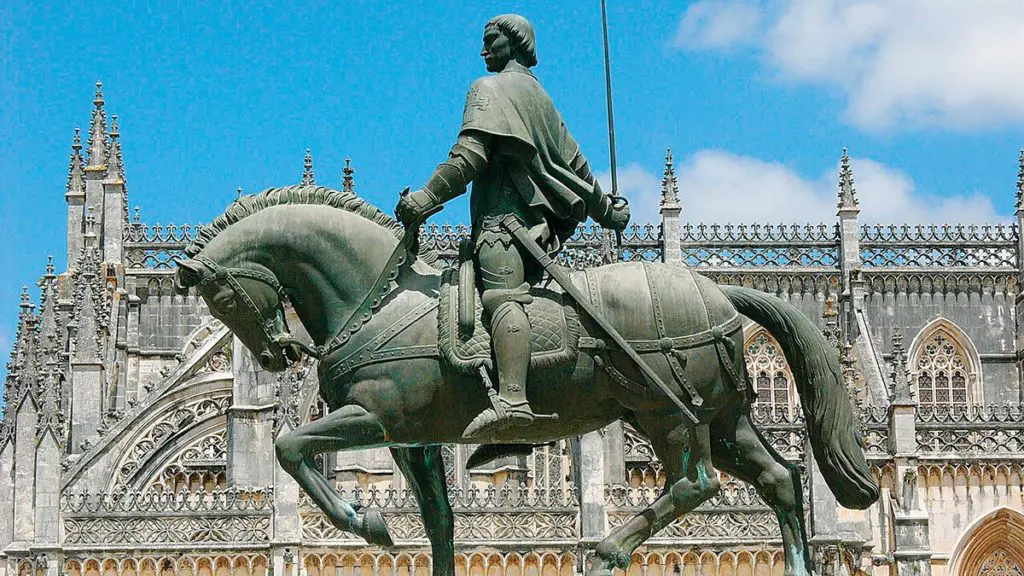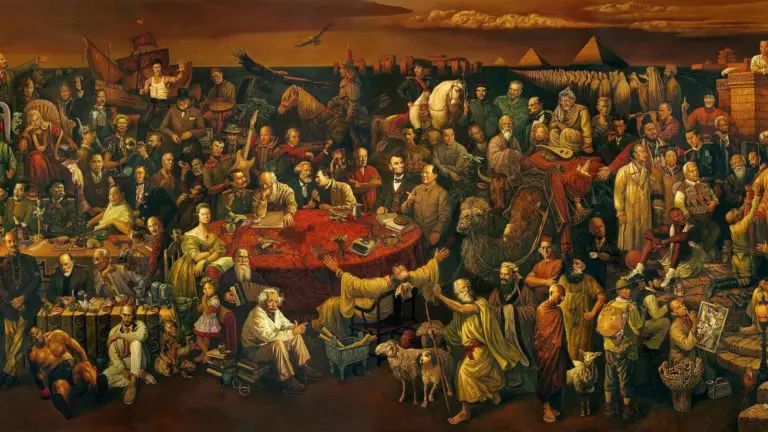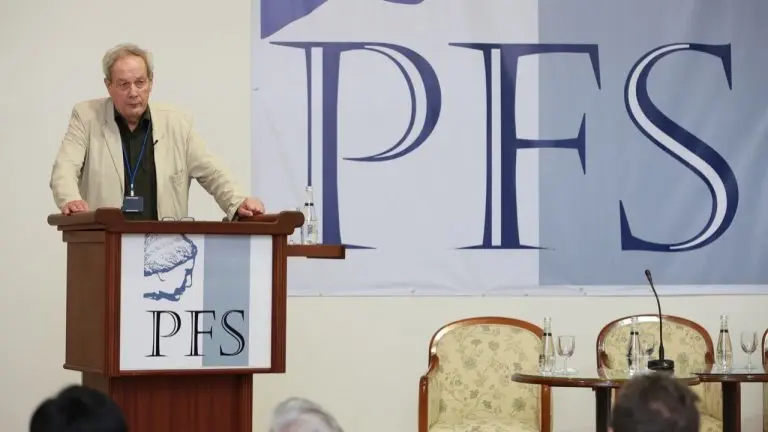There is across the planet to-day a real shortage more dire than that of food and fuel, and a worse evil than inflation or unemployment. It is in fact a dearth of real, authentic leadership. Now, that might seem paradoxical, given that the past few years have seen most of the world’s population forced to do its masters’ bidding, mandated towards masks and injections in most places; away from the Traditional Mass by the Catholic Church leadership; and into war by the rulership in Russia and Ukraine. Certainly, the myth of democracy has never appeared more mythic than now. But to understand what we need, we must really comprehend what we have.
The first thing we must understand is that every human society that has ever existed has been made up of the rulers and the ruled. The former are always a minority, and the latter a majority. Every society has a State Church, and established Faith, an animating philosophy which—religious or not—gives the rulers their legitimacy and authority, and set the rules whereby the members of the given society play the game (or pretend to). The State may well be separated from my Church, but some body of belief fulfills the role, and the State cannot be separated from it.
A basic problem with our Western systems is that they deny these two omnipresent realities. This has the unfortunate effect of making the rulership irresponsible, in both the constitutional and popular senses of that word. In the Middle Ages, Authority—the right to say what ought to be done—was concentrated in Church and King. Power was diffuse. With us, it is the opposite; Power—the ability to make things happen—being concentrated, and Authority diffused among a semi-mythical electorate.
Under this unpleasant reality, it is no surprise that power is wielded to-day in an authoritarian manner. But what makes modern leadership interesting is that, regardless of its nationality (or, in the case of the Church, lack thereof); and in, with, and under its democratic cloak of semi-invisibility; it always shares three major characteristics to a greater or lesser degree. Each of these qualities deserves a proper look.
The first is, to be blunt, Evil. By this I mean that that our leaders tend to have no regard for Truth, Goodness, or Beauty, but only the pursuit of power. The laws of God and Man are utterly meaningless to them, save when those laws are convenient weapons to use against opposition (which generally means those of us who DO respect such laws). The violation of these laws is no hindrance; even the blood of the innocent—whether unborn, ill, religious minorities, refugees, elderly—does not stir their compassion. Indeed, our leaders can be quite bloodthirsty. For all that they enjoy talking about compassion and all sorts of other virtues, they do not exhibit even basic kindness in their decisions.
One sure sign of evil is the twisting and confusing of virtue and vice. For such as our leaders, human beings have no value save as sources of money or blood in war. Because leadership is a good given to man by God, it is no surprise to find that, in time, evil leadership becomes the negation of that gift.
The second characteristic of our current elites is insanity. Now, by this I do not mean they believe themselves to be Napoleon or some other such delusion. But for a dominant set, insanity means that the visions in their heads are more real to them than not only the welfare of their subjects (being evil, that is not an issue) but their own self-interest. For example, for the Nazis, implementing their genocidal racial policies on the Eastern Front was more important than defeating the Soviet Union. Today, for much of the American political leadership, it is more important to have women in combat than to win battles. In the Church, hierarchs attack whatever element of the Body that shows growth; in local communities, mayors and/or city councilmen defund the police.
The third of this unholy trinity is stupidity. By this, I do not mean a mere vulgar insult. No, stupidity is the marriage of two other elements, by no means wonderful by themselves but lethal when combined: ignorance and arrogance. The ignorant person who is humble may learn; the brilliant but arrogant man can be annoying, but at least has some justification. The stupid man in charge knows little of what his office requires, and cares even less, because he believes that he is Always Right. He does not even pretend to make sense, simply wielding his power to force his hapless subjects into line—regardless of the result.
In a ruling set, at least to my eye, these vices come in order: the evil comes first, followed by the insanity, and last of all, the stupidity—which, like the Pale Horse, brings Hades in its wake. These three qualities tend to reinforce each other over time, dragging the masters and their minions ever further down. Stupidity is probably the hardest of these three vices to live under. With evil, if a citizen can understand how his rulers are bent, he can work around their wickedness; with insanity, all he needs to do is to figure out the path of the mania, and plan accordingly. But stupidity is wild and unpredictable. It can literally do anything; sometimes it even errs in favour of the good.
Of course, as earlier noted, evil leadership is no leadership at all. Nor is insane nor stupid leadership either. So let us look at their opposite qualities, which in fact define real, true leadership. The first of these is of course Goodness. A good leader—that is, a real leader—is devoted to a cause above and beyond himself and his own comforts and desires. He is willing to sacrifice himself for his God, his Country, his belief—and for those he leads, who are as precious to him as the cause which motivates him. Indeed, the well-being of both ruler and ruled are bound up together. The good leader believes that his own eternity may well depend upon how he tries to fulfill his responsibilities to his subjects.
The good leader is Sane. What does that mean in such a one? It means he strives to see things as they are, not as he would wish them to be. If he truly feels his views can improve the world around him, he never leaves out of his reckoning the realities of Divine and Human nature. He ever strives to make his judgements conform to objective reality, and is willing to surrender preconceived notions, particularly if they get in the way of his higher goal.
Lastly, he is Intelligent. Humble enough to know when he does not know, he seeks to learn ever more about the situation he is dealing with. He can never learn enough about it. Such a leader will employ every means at his command to acquire evermore knowledge. He is not too proud to consult others. Moreover, he tries to know his opponents as they are, rather than simply demonise them. If he can find points of contact, or at least understand the other side’s motivations, he will. At the end of the day, while resolute to follow a course of action, he is not too proud to admit that he may be wrong. As a result of his humility, this leader is able to reason clearly and act decisively. Of course, as with their negations, these qualities feed into one another. Goodness will spark sanity, and they together in turn shall create intelligence.
One might well ask at this point why our dominant classes have ceased to produce decent leaders. There are any number of reasons. The World Wars knocked the stuffing out of Europe’s pride in itself and in its accomplishments, both as a culture and on a national basis. Then there is the decline of belief in God, and the growth of functional Universalism amongst the Catholic hierarchy, with the attendant implosion of that body’s very raison d’etre, at least in the minds of those who govern her. The rise of technology has helped spread among the masses—from whom, ironically, a chunk of the rulership is regularly recruited in any society—a cult of comfort rather than sacrifice, which in turn is reflected in those in charge. The unbridled pursuit of our own comfort leads to indifference to the pains of others, and at last a sort of unthinking cruelty: this is how abortion has been sold. Of course, the very concept of leadership itself has been knocked about, with egalitarianism proclaimed as our birthright as all the while real liberty continually shrinks, and power is increasingly concentrated offstage, as it were.
The vast majority of those who dictate the course of our lives for us fall into the vicious set of qualities. Yet there is great virtue in turning our attention more and more towards the virtuous set, rather than focusing solely on the vices. Any culture or group ruled by vice is doomed unless and until the corresponding virtues. So we must keep our eyes open for any such folk who emerge in the current wrack. Of course, most of us are mixed creatures; but when we see any scrap of these virtues in our fellow men, we should support them to the best of our ability. Moreover, we should try to cultivate Goodness, Sanity, and Intelligence in ourselves.
Indeed, there is another quality we should try to add to the other three: Initiative. Wherever we are, and whatever condition we find ourselves in, if there is something we can do to improve the immediate situation, we should. It is an old maxim of leaders in clubs and associations that if someone has a bright idea for a new effort, as soon as the leaders give him the opportunity to form a committee and do it himself, he usually disappears. Let us be different; let us come up with ideas that we ourselves are willing to try and carry out.
So let us begin again. Let us look first at the great epitome of leadership, Christ Himself, the great King who did not hesitate to lay His life for His friends. We must venerate the great Saints of civil authority—Bl. Charlemagne, St. Louis, St. Nuno Alvares Pereira, Bl. Charles of Austria, of course, and the many other great Saints who have been leaders as well. Let us look at the great leaders of the past for inspiration, bearing in mind that they need not have been perfect. George Washington voluntarily gave up complete control of the newly independent colonies and returned to his farm, which led George III to exclaim upon hearing the news, “If this be true, then General Washington is the greatest man of the age!” Despite their flaws, many 20th-century leaders represent these virtuous leadership qualities; Charles de Gaulle preserved France’s independence against the best efforts of both FDR and LB; Churchill held firm during the War; and Chiang Kai-Shek kept his flag flying into exile. Francisco Franco, despite what happened after his time, managed to unite the fractured Spanish Right sufficiently to defeat the Communists. One could multiply such examples endlessly by both time and place.
Moreover, we must inculcate such veneration on the one hand and admiration on the other into our young—at home, of course, and in any schools we have influence upon. We must try to recapture the spirit of Chivalry, which has always been the foundation of leadership in the Christian West. Whatever occupation we find ourselves in—Fatherhood, mentorship, managerial, military, religious, or whatever—let us strive mightily to be Good, Sane, and Intelligent. The great lack of our day is leadership; may God send it to us soon!





